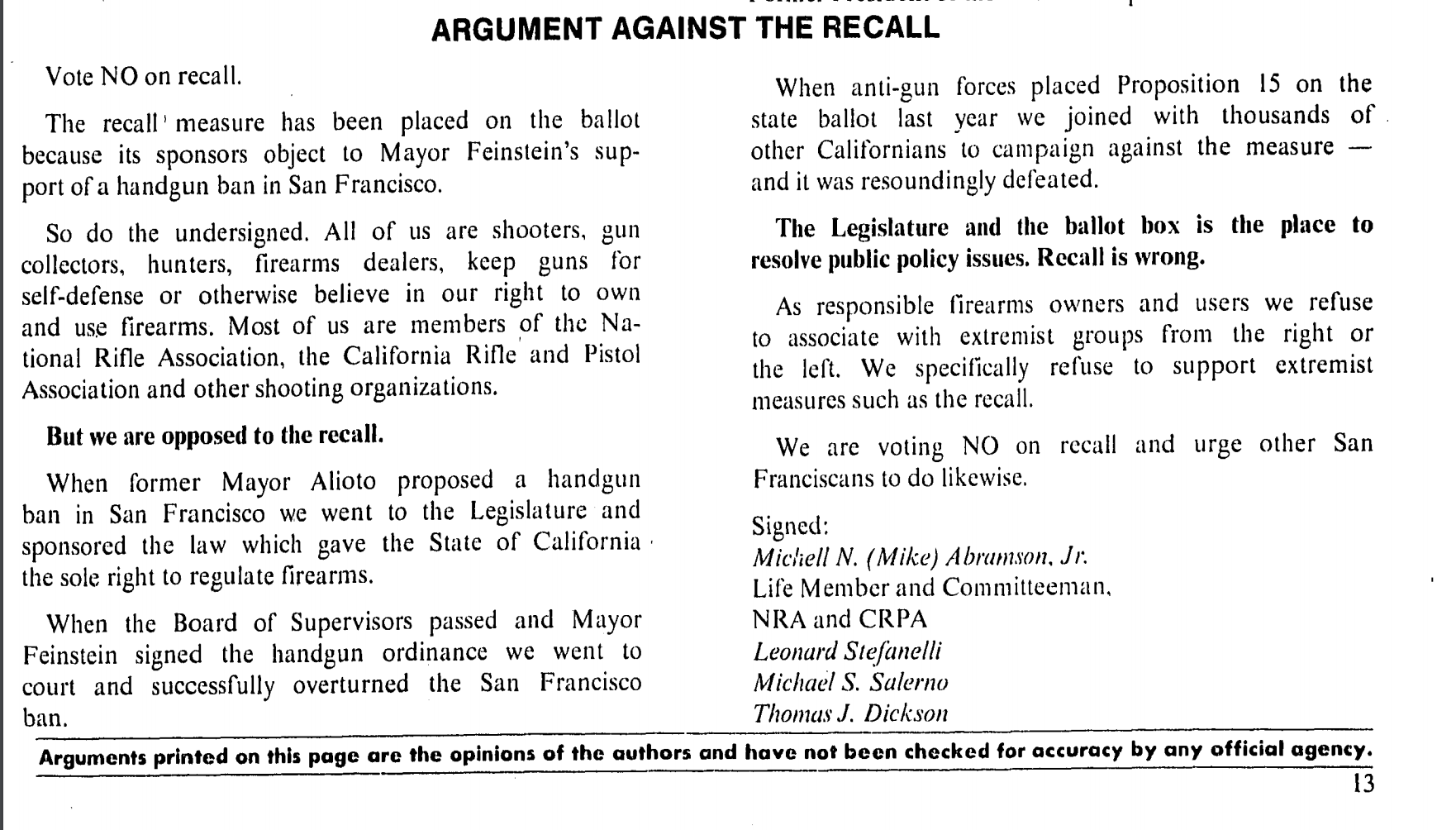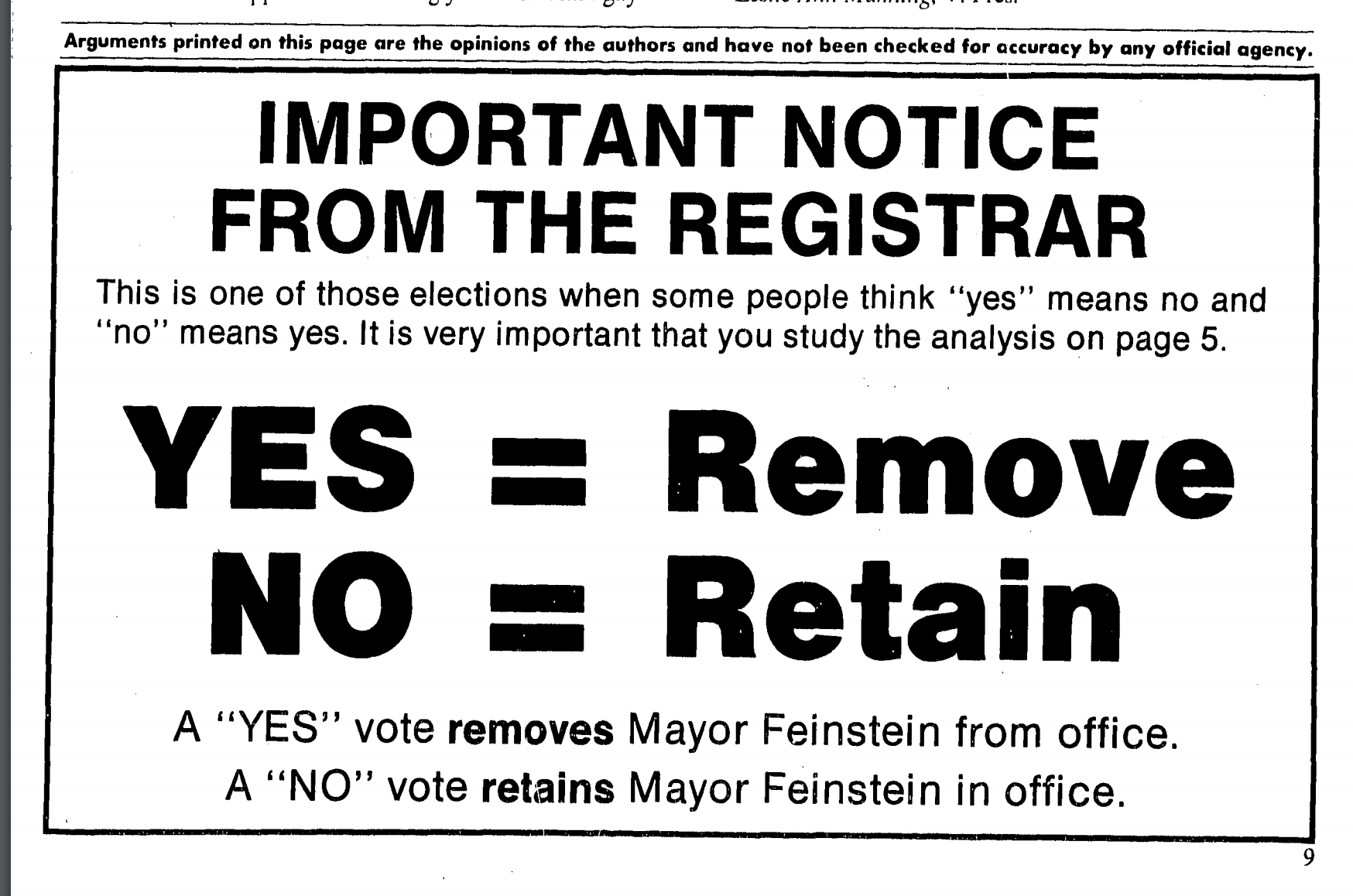April - Recall of Dianne Feinstein
1983 was an odd year in San Francisco history, especially when viewed from 2018. There were two elections in 1983 for San Franciscans - the first coming in April, with just one question: should the City recall Mayor Dianne Feinstein? The campaign to recall then-Mayor Feinstein was led by the White Panthers, who were upset with Feinstein's leadership in passing legislation to ban handguns in San Francisco (a ban that was later overturned by the state court of appeals). Despite their rather confusing name, the White Panthers were a group formed by white people in support of the Black Panther Party - and were opposed to a ban on handguns for fear that such a ban would leave the poor defenseless.
The recall election was not close - over 80% of voters rejected the measure. While the recall was originally over a handgun ban, others voted for a recall because of other issues they had with Feinstein; such as the SF Tenants Union:

Interestingly, the NRA did not support the recall effort - explicitly writing against it:

Since ballots can be confusing, the Registrar helped clarify what exactly voters were voting on:
 All screenshots taken from the April 1983 Voter Pamhplet, available from the SFPL.
All screenshots taken from the April 1983 Voter Pamhplet, available from the SFPL.
November
After the special election in April to vote on the recall, a full slate of 16 propositions were on the November ballot, along with another election for Feinstein as mayor. After defeating the recall with over 80% of voters, Feinstein easily won re-election as well with close to 80% of the vote.
Making it harder to recall elected officials
The recall vote in April wasn't close at all - but the City nevertheless had to organize and pay for the election itself to be run. In response to the recall election, the Board of Supervisors unanimously voted to place Prop A on the ballot in November, which would require signatures from at least 10% of total registered voters in order to place a recall election on the ballot. At the time, only 10% of total voters in the previous mayor election were required to have a recall put on the ballot. Presumably fed up with the April election, San Franciscans passed Prop A with 75% support.
Opposition to bilingual voting - sets the stage for state-wide initiatives
Despite being generally thought of as a "progressive" city, Prop O in November of 1983 may come as a surprise to readers in 2018. Titled "Opposition to Bilingual Voting", Prop O was simply a "declaration of policy," which would "require the Board of Supervisors to adopt and the Mayor to sign a resolution urging the Congress and President of the United States to change federal law so that in the future the City and County of San Francisco would print ballots, voter handbooks and other official voting materials in English only."
In other words, Prop O wouldn't itself change anything - under federal law, San Francisco would still be required to provide voter materials in Spanish and Chinese 1. Nevertheless, it was seen as the opportunity to "send a message" - if San Francisco, of all places, could pass such an initiative, then surely other parts of the country would support English-only ballots. Prop O passed with 62% of the vote.
Despite being a mostly symbolic measure, Prop O set the stage for U.S. English, a group advocating for English to be the "official" language of the United States, to bring the issue to the state of California. The Washington Post wrote, "If the measure could pass in San Francisco, supporters figured, it could pass almost anywhere." In the following years, U.S. English pushed for two California measures on the topic. Prop 38, "Voting Materials in English Only", was passed in 1984 with 70% of Californians in support. A few years later in 1986, Californians passed Prop 63 at 73% of the vote, declaring English to be the official language of the state of California.
Through the lens of 2018, the overwhelming support for English-only ballots by San Franciscans (and Californians more generally) may come as a surprise - but is a good reminder of a not-so-distant history of voting rights issues in even a "liberal" or "progressive" place like San Francisco.
-
The Language Minority Provisions of the Voting Rights Act required multilingual ballots depending on the number of members of a single language minority group. In San Francisco in 1983, Spanish and Chinese were both required under the VRA. ↩